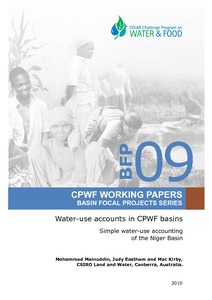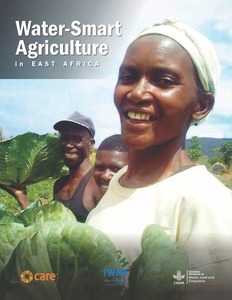Water security and climate change challenges in developing countries
Water productivity in the Syr-Darya River Basin
This report analyses water productivity and water-saving initiatives in the Syr-Darya river basin in Central Asia and presents institutional and political aspects of water management in the basin.
Water resources management research issues in the highlands of Baluchistan: workshop proceedings
Water productivity and water footprint: misguided concepts or useful tools in water management and policy?
Water productivity (WP) and water footprint (WFP) are popular concepts in research and discourses on water management. Yet there are concerns about their theoretical validity and practical value. This paper shows that the water production function, the concept with a sound theoretical foundation, is the basis for WP. Total WFP is the reciprocal of WP. The practical value of WP and WFP depends on the context of water use and stress. Maximizing WP, not a panacea to all water problems, mainly suits arid rainfed areas.
Water use productivity and profitability of small scale irrigation schemes in Ghana's Upper East Region
Winners and losers of IWRM [Integrated Water Resources Management] in Tanzania
This paper focuses on the application of the concept of Integrated Water Resources Management (IWRM) in Tanzania. It asks: how did IWRM affect the rural and fast-growing majority of smallholder farmers' access to water which contributes directly to poverty alleviation and employment creation in a country where poverty and joblessness are high?
Water-use accounts in CPWF basins: Simple water-use accounting of the Niger Basin
This paper applies the principles of water-use accounts, developed in the first of the
series, to the Niger River basin in West Africa. The Niger Basin covers 10 countries, and
rises in the highlands of southern Guinea near the border with Sierra Leone just 240
km inland from the Atlantic Ocean, but there are substantial downstream tributaries
from Cameroon and Nigeria. A unique feature is the inland delta which forms where its
gradient suddenly decreases.
Net runoff is about 12% of total precipitation. Grassland is the most extensive
What role can information play in improved equity in Pakistan’s irrigation system?: evidence from an experimental game in Punjab
The Indus Basin Irrigation System suffers significant inequity in access to surface water across its millions of users. Information, i.e., monitoring and reporting of water availability, may be of value in improving conditions across the basin, and we investigated this via an experimental game of water distribution in Punjab, Pakistan. We found evidence that flow information allowed players to take more effective action to target overuse, and that overall activities that might bring social disapproval were reduced with information.
Water-smart agriculture in East Africa
Wetlands of the Nile Basin: distribution, functions and contribution to livelihoods.
Wetlands occur extensively across the Nile Basin and support the livelihoods ofmillions of people. Despite their importance, there are big gaps in the knowledge about the current status of these ecosystems, and how populations in the Nile use them. A better understanding is needed on the ecosystem services provided by the difl:erent types of wetlands in the Nile, and how these contribute to local livelihoods.





